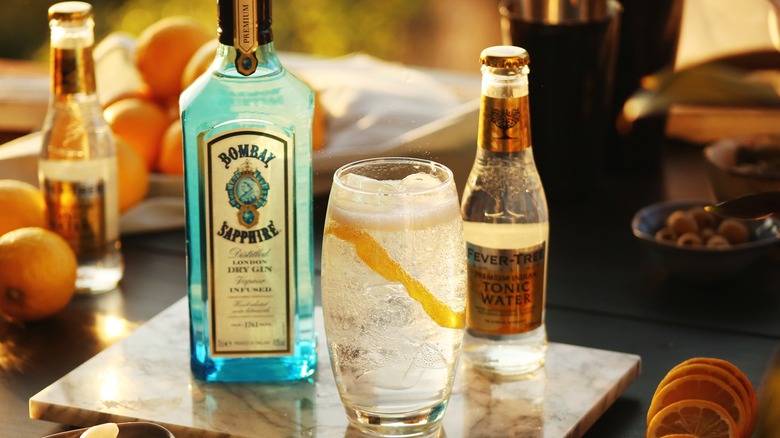How To Perfectly Pair Your Gin With Different Tonic Waters
If you're looking for the ideal oscillation between two opposing flavors, look no further than the delightful combination of gin and tonic. As the base liquor, gin offers a complex and aromatic blend of botanicals. Notes of juniper, coriander, and citrus complement the tonic water's bitter and slightly sweet carbonation.
Mixing the two ingredients creates a harmonious blend of flavors you can upgrade with different gins and tonic waters. Some prefer a more punchy and aromatic version, while others prefer a milder gin taste that is softened by the tonic water. While the pairing might first appear quite basic, choosing the right tonic water can make or break your cocktail-drinking experience. As Mikael Karttunen, brand ambassador for Helsinki-based wine and spirits company Anora, told Nordic Spirits, "Many gin and tonic aficionados have their own favorite gin, but the role of the tonic water is also crucial."
The right balance of flavors can be achieved by adding different ratios of gin to tonic water or by choosing different brands with varying flavor profiles. After all, no two gins are alike, just as not all tonic waters are created equal, and there are several ways to modify a traditional G&T just by tinkering with the key components. Whether you're looking to shake up your tipple game in the summer months or just want to learn how to heighten your appreciation of this classic cocktail, exploring the spectrum of expressions in both gin and tonic water will yield countless tasty pairings.
Get familiar with different types of tonic water
With a typical ratio of gin to tonic falling somewhere between 1:3 and an even split, clearly, both ingredients are equally important. So, let us introduce you to a few of your main tonic water options: Indian, Mediterranean, and flavored.
Indian tonic water refers to traditional tonic water (called Indian due to its roots in colonial India). As the strongest option, it boasts a distinct bitter flavor with higher levels of quinine. East Imperial Tonic is a great example of a strong Indian tonic water that pairs well with citrus-forward or London Dry gins.
Mediterranean tonic water, on the other hand, is known for its lighter, refreshing taste with a subtle lemon and floral aroma, making it perfect for citrusy or floral gins. Fever-Tree, one of the most popular tonic water brands (that also happens to have a lower sugar content), recommends pairing its Mediterranean tonic water with a gin like Bombay Sapphire Gin, which is well-balanced and floral, or Tanqueray No. Ten with its natural notes of orange and pink grapefruit.
Flavored tonics offer a wide range of tastes, such as cucumber and elderflower, which you can use to enhance the natural flavors of any gin you choose. London-based mixers brand Double Dutch makes a cranberry-ginger tonic water, and East Imperial has yuzu and grapefruit varieties.
Choose the right gin
Crafting the perfect gin and tonic starts with choosing the right tonic water. However, that's tough to do if you're not pairing it with a gin you like. When choosing the right gin, forget about price points and fancy brands. Instead, sample a variety of gin styles to determine your preferred taste.
Start by trying a London Dry gin, like Beefeater or Tanqueray. They're both high-quality gins with a dry and light taste that is typically heavy on the juniper. Or seek out a sample of stronger navy strength gin bottled at 57% ABV (compared to London dry gin's 40% ABV). Navy strength gins have a stronger flavor and aroma due to the higher alcohol content but still maintain gin's piney juniper flavor. If you prefer a sweeter burst of flavor, try a unique flavored gin like Tarquin's British Blackberry Gin sweetened with Cornish wildflower honey.
Speaking with Nordic Spirits, Mikael Karttunen added that after identifying your favorite gin, it's helpful to decipher the dominant flavors in it. It's key in determining what kind of tonic water you'll choose to pair it with, with classic, dry gins pairing better with tonic water that complements the gin's juniper-forward flavors. If you prefer a gin with a more diverse flavor profile, you can experiment with floral or fruitier tonics to accentuate its unique qualities.
The bottom line? A classic gin usually pairs best with a classic tonic, while a more complex gin demands (and deserves) some experimentation.


